
The start of a Trail Nut Trail Race at Falling Creek Park in Bedford County, Virginia. (Image courtesy of Jay Proffitt Creative Media)
BEDFORD, Va. — Bookended by two of Virginia’s most vibrant running communities, Bedford County is an expansive and sparsely populated region tucked along the scenic Blue Ridge Mountains. The county between Roanoke and Lynchburg is probably best known as the home of the National D-Day Memorial, but over the past two decades, it has emerged as one of the most sought-after trail and ultra running destinations in the state.
The mountains do more than offer passing vistas — they define this county, shaping how its residents interact with the nature around them, how they hunt and grow food, how they explore, how they breathe. They provide exposure to every isolating and fickle vertical and horizonal challenge imaginable.
But for those who aren’t regulars on Bedford County’s winding mountain trails — made treacherous by dense shade, wild animals, old-growth roots and ankle-biting rocks — it’s easy to overlook just how popular this area is to the running community, with many races drawing people from all over the United States.
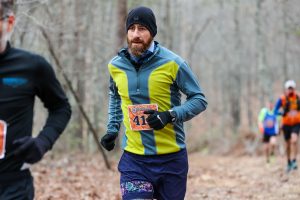
Ryan Tipps makes his way up the rocky and uneven trails of the Forever 10 Mile Trail Race, put on by Mountain Junkies. (Image courtesy of Jay Proffitt Creative Media)
The county is home to the Promise Land 50k++ and Terrapin Mountain 50k ultra races, and it hosts a large swath of the famous Hellgate 100k++, which many claim to be the toughest 100k on the East Coast — for reasons beyond merely the extra mileage the race includes to reach its sinister-sounding 66.6 miles. Additionally, the Mountain Junkies organization hosts an early season Roanoke Non-Ultra Trail Series (RNUTS) that has three of its seven weekends of racing in Bedford County: the Forever 10 and 5 Milers, the Montvale 8.5 and 5 Milers, and Falling Creek Park’s Trail Nut Half Marathon and 10K.
Nowhere else in the state, and perhaps even around the mid-Atlantic region, is there such a concentration of official trail races available to distance athletes.
Most of the credit for where Bedford County is today goes to Dr. David Horton, a health sciences professor at Liberty University in Lynchburg who teaches beginning and advanced running classes. Horton — who relocated to Central Virginia in the late 1970s and ran his first ultra race, the JFK 50, in 1979 — is a legend in the ultra running community.
“When I came to this region, there wasn’t any ultra running around,” he said.
Horton changed that.
“The farther they run, the more people like it,” he said. “The greater the difficultly, the greater the challenge, the greater the reward.”
It’s part location, part community and part culture that drives so many people to Bedford County.
During an episode of the Ridge RUNers podcast, Rachel Spaulding, the record-setting winner of the 2021 Hellgate, noted that no one runs Hellgate because they want to run just another 100k race; they run it because they want to run Hellgate itself. It’s something special — the hard-scrabble terrain, the 12:01 a.m. December morning start and the 13,000 feet of elevation gain carry with it its own identity, its own vibe.
Roughly 150 racers compete at Hellgate annually, and the past two decades have dealt these competitors wildly different experiences, ushered in by the unpredictable weather along the Appalachian Mountains. Two years ago, for example, a cold rain that then iced up on gravel roads and often forced the runners into the ditch. One of the first years of Hellgate delivered 18 inches of snow. Another year had a low of 8 degrees, causing runners’ water bottles to freeze, along with some of the food at aid stations.
And amid it all, this Western States qualifying event still goes on.
No matter the conditions, “We still hold the race. We’ve never canceled Hellgate, ever,” Horton said, defiantly.
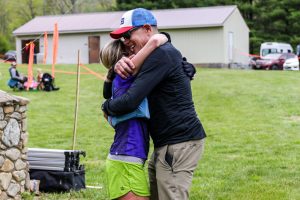
Dr. David Horton hugs a Promise Land finisher. (Image courtesy of Jay Proffitt Creative Media)
Promise Land in Bedford County is also a favorite of East Coast runners, though for different reasons — many call it the prettiest race around and a particularly challenging feat.
“Promise Land is a race of seasons,” Horton said, noting how much the landscape and 7,300 feet of elevation gain over 34 miles changes the April race experience. “You start out in spring, where the grass is green and there’s leaves on the trees. Then you go up and up and up, and you go right below the summit of Apple Orchard Mountain, and there’s no leaves on the trees — it feels like winter. Then you loop down on the far side, past the falls, and back down into spring. You do a loop down there and come back up to the Blue Ridge Parkway, and you’re back up to winter. Then you finish in the warm part of the day, and it feels like summer.”
The race’s waterfalls are particularly enticing, yet some years, the spring weather has dropped so much rain that racers hold hands trying to cross the streams, “forming a human chain.”
“It’s a great reward to finish” this event, Horton said.
Trails in the Bedford County Parks and Recreation system, as well as those on U.S. Forest Service and National Park Service lands here, blend intensity, history and diverse terrain to keep people coming back for these rewards.
Growth of the Ultra Community
Horton was instrumental in the creation of races such as Promise Land and Hellgate, as well as several other renowned ultras in Central Virginia, including Grindstone and Mountain Masochist. To date, he has directed over 100 races.
Importantly, he helped to fuel the shift from holding ultras on roads during the 1980s and early ’90s to the mountain landscapes that are more popular today.
Bedford County has “really nice trails, and people love trails,” Horton said. Even with the notorious elevations that “Horton races” deliver, this kind of surface is about what’s “enjoyable, and getting back to nature. They’re a lot easier on your body, too, mentally and physically. Running on roads is tough.”
He knows the difference. Horton has run more than 113,000 miles during his lifetime, and he held speed records for the Appalachian Trail in the early ’90s as well as the Pacific Crest Trail in 2005. He’s also crisscrossed the U.S. coast-to-coast twice on foot (once on trails and once on roads), and likewise twice by bicycle. Horton, who is in his 70s, finished the full 100 miles at the Barkley Marathons — the first American to ever do so — at the age of 52.
He is a man of determination and achievement — and of stoking jovial misery on race day. Blue Ridge Outdoors magazine says of him: “Runners aren’t sure whether to admire the man or fear him. Or both.”
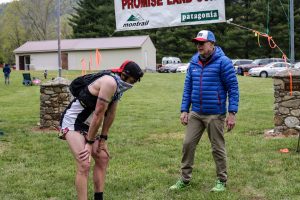
Dr. David Horton chats with a runner after the Promise Land 50k++ race in 2021. (Image courtesy of Jay Proffitt Creative Media)
His bluntness is somehow both jarring and endearing; he proves himself approachable and respected for the way he assigns ranked bib numbers or calls out a runner’s shortcomings, only to motivate them. It adds to the aura of the races he leads, to the reason people come to Bedford County to take part in his creations. The professor has had decades to hone how he approaches this sport and supports it.
In the end, he celebrates all who compete.
“I ran ultras for 30 years until I had to get a knee replacement, and I’m certain that the reason I had to get a knee replacement is that I ran too many early miles on roads,” he laments. “Roads beat you up.”
Trails are where Horton focuses his running classes. When asked what one does in a running class, Horton gives the obvious answer: “We run!”
And run they do. But there’s more to it than that.
His beginning class, which usually has about 15 students, runs at least 240 miles during the semester, while the 10- to 12-person advanced class has to total 360 miles. They discuss several topics, such as running vs. power hiking during an ultra. Those in the advanced class in the spring are required to run an ultramarathon, and most of them run Promise Land. Horton proudly states that he’s never had a student not finish it.
Not only do the students have to run a race, but they also must help with one, giving them a well-rounded perspective of the sport and what it’s like to be on the support side of an event.
All of this has nurtured the trail running community around Lynchburg and into Bedford County and grown some of these marquee races to 300 or more people, drawing runners from places like Utah and Michigan, as well as from across the Eastern seaboard. Hellgate, which will be 20 years old in December 2022, has the most geographically diverse lineup of the races that pass into the county’s borders.
Non-Ultras Also Draw Big Crowds
Toward the end of Hellgate, Horton explained, “There’s a section from the gravel road over to Day Creek that just seems like it goes on forever.”
Most people know it as the Forever Section, and that’s where Mountain Junkies founder Josh Gilbert added his newest RNUTS race in 2021.
The Forever stretch — an uneven and rock-infested horse trail with multiple stream crossings — is marked with icy patches during the winter when Gilbert’s race takes place, while highlighting Virginia’s suffocating humidity during the summer months and miles of calf-deep leaves throughout the fall. Mix in common bear sightings and occasional snakes, and it’s easy to see how the challenge can draw in some of the region’s most adventurous runners to this and other Mountain Junkies events.
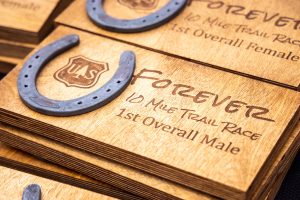
Awards from the inaugural Forever 10 Mile Trail Race in 2021. (Image courtesy of Jay Proffitt Creative Media)
“One of the goals behind the series is to introduce people to these places. Otherwise, it’s kind of like an inside job to know where to go,” said Gilbert, who regularly draws close to 200 competitors on a given weekend.
It’s a major way that Gilbert seeks to grow the Roanoke-area running community and include Bedford County’s trails.
RNUTS is entering its 14th season and emerged as a cohesive series after Gilbert recognized a need for trail events under 30 miles. Some of the courses it includes have history in other outdoor activities and races, such as mountain biking, and Gilbert has seen many of the region’s trail systems grow alongside his events.
The affable and motivational Gilbert has a passion for trails, himself having raced in the first Hellgate in 2003, and still travels across Virginia and to destinations out west to compete. But in the early days of his non-ultra series, there really weren’t that many trail running venues available that people were familiar with. His events have helped to showcase the off-road opportunities in Bedford County and the neighboring localities.
The expansion of Gilbert’s non-ultra trail series is partly credited to Kenny Palmer, who is now Bedford County’s parks and recreation operations coordinator. Palmer’s trail-building skills are a reason that the county’s parks can squeeze so much trail mileage into each acre — and still have room for disc golf courses, picnic areas and pavilions.
“I’ve always approached the things I do at parks and rec from the perspective of building things the local community will use and enjoy, but to do it so well that people from other communities want come here and enjoy them too,” Palmer said. It’s the heart of recreational tourism.
Mountain Junkies’ RNUTS races bring scores of people to Bedford County for races on the Forever horse trail and at Montvale and Falling Creek parks and help to nurture overlap in the trail communities in Roanoke and Lynchburg.
“Montvale Park is crazy because it’s like 85 acres and there is nothing that isn’t utilized,” Gilbert said. “To cram that much trail into a park, it’s phenomenal. It’s all old growth, and everything about it is cool.”
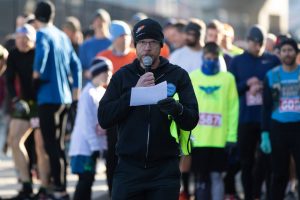
Josh Gilbert is race director for the Roanoke Non-Ultra Trail Series. (Image courtesy of Jay Proffitt Creative Media)
Falling Creek Park is home to the only RNUTS half marathon distance, and like at Montvale, Palmer found a way to use the land in ways most other trail builders wouldn’t be able to accomplish.
“The trails basically loop back and forth along the hillsides to get as much mileage as possible and still make sense,” he said. “To connect everything together, I used the numerous open fields but tried to stay close to the creeks and cedar patches in the fields to make those flat sections as scenic and fun as possible.”
Bedford County has provided Gilbert and Mountain Junkies straight-forward permitting for races, and the fact that it’s a geographically large county with ample parking and other amenities has helped solidify its position as a trail destination.
Gilbert has also been vital in helping make trail running more approachable, with his series having 5k and 5-mile distances up to the possibility of a full trail marathon in the county that neighbors Bedford. He and Horton have inspired a mountain culture that has not only survived for decades but continues to grow stronger, more inviting and more desirable with each passing year.
With the Roanoke and Lynchburg trail running hubs so close, Bedford County “is a great middle ground,” Gilbert said. And there are few places that attract people to the trials of the trails quite like this place.
Ryan Tipps is Managing Editor for ActionHub. He lives along the Blue Ridge Mountains, is an avid hiker, backpacker and trail runner and has been a part of the wilderness search and rescue community since 2005.
Photography for this article is from Jay Proffitt Creative Media.
 Your Privacy Choices
Your Privacy Choices
 The
The